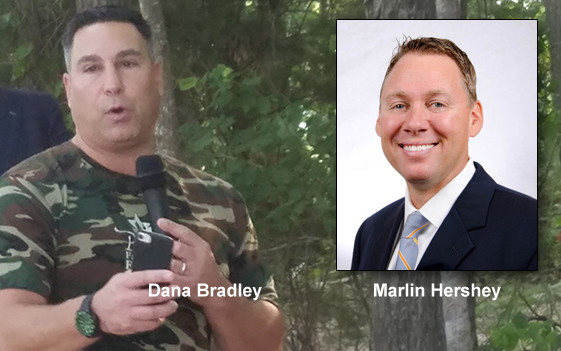
Dana Bradley, Marlin Hershey get prison time
Feb. 23. By Dave Yochum. Family, friends, victims and two US Attorneys filled a Charlotte courtroom yesterday afternoon as two Cornelius men who pled guilty to wire fraud conspiracy for orchestrating a large-scale investment scheme were sentenced to prison terms and probation.
Attorneys for both Marlin Hershey, 54, and Dana Bradley, 53, both of Cornelius, asked for home-based detention, but were denied the opportunity to serve time in their million-dollar lakefront homes.
Hershey got the heavier sentence: 21 months in federal prison and two years supervised release. Bradley, who came across as both contrite and humiliated when he addressed Judge Frank D. Whitney, got 10 months and two years supervised release.
The two, who headed up Performance Holdings in Kenton Place, confessed to skimming 10 percent off the top of some investments without telling their clients, many of whom were high-end investors—as well as friends and, in some cases, family members.
Hershey’s sister—Melanie Rockefeller and her former husband Scott—invested more than $1 million and lost it all.
As Judge Whitney was weighing all the redeeming factors against criminal factors, Melanie said she hasn’t spoken to her “big brother” in eight years. She said: “I hope you hold Marlin accountable because no one ever has.”
Ponzi scheme
Whitney did so, but with compassion for the duo, both of whom have families. “I frequently see good people doing bad things and that’s what we have here,” the judge said, nevertheless describing their enterprises as a Ponzi scheme.
“New investor money was used to pay off early investors that caused real harm,” said Assistant US Attorney Taylor Stout.
Details
From approximately 2009 to 2021, Hershey and Bradley conspired to defraud numerous victims who invested in two unregistered securities offerings promoted by the defendants, Performance Retire on Rentals (PRR), and Distressed Lending Fund (DLF).
Both enterprises eventually failed causing significant losses to investors, one of whom, a doctor, said he lost $975,000. He said he invested more and more money, getting a little bit back until it stopped. “I realized my goose was cooked,” he said.
The flip side, according to Bradley, was that he was both stubborn and determined to turn a bad investment around by pouring more money in.
“I was too stubborn to accept that PRR and DLF had failed,” he said. With a military bearing but a choked-up voice, he said: “My spirit is crushed.
Methodology
According to the Feds, Hershey and Bradley provided victims with investment materials for PRR and DLF that contained false and misleading statements and did not disclose commission-like payments based on the amount of investments they sold.
In fact, they admitted to providing investors with offering materials that represented the opposite – that nobody would be paid a commission in connection with the investments. Hershey and Bradley received payments that were typically 10 percent of an investor’s initial investment and often received an additional 10 percent when an investor extended an investment.
According to court records, Hershey and Bradley also failed to disclose negative information about the financial woes faced by some of the entities for which they were soliciting investments. Indeed, because Hershey and Bradley often solicited the same group of investors to invest in various enterprises, the defendants took steps to conceal such financial difficulties by making undisclosed loans to various entities so that the entities could, in turn, make their required interest payments to investors.
Hershey and Bradley also solicited new investors and used the new investors’ money to repay the loans and to make Ponzi-style payments to previous investors.
It wasn’t until years later that investors learned for the first time that the projects in which they had invested could no longer meet their obligations to investors.
What’s next
Bradley and Hershey must pay more than $333,000 in restitution to victims and combined forfeiture and fines of more than $600,000. They will be ordered to report to the federal Bureau of Prisons when a federal facility is determined.




